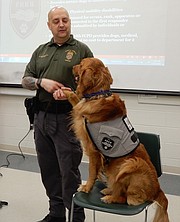PFC Dusty Granofsky addresses the meeting while his dog, Lennie, listens. Photo by Bonnie Hobbs.
When people think about police dogs, what normally comes to mind are K9s trained to find drugs and criminals. And they can be pretty scary and ferocious when they’ve found their suspect.
But in addition, the Fairfax County Police Department now has peer support service dogs. Their main purpose is to provide comfort to the officers – who often handle dangerous and traumatic situations – and to help them deal with the stress of their jobs. And some of the dogs also respond to crime scenes to give support to both victims and first responders.
The Department has five of these dogs, and two of them plus their handlers came to the Feb. 12 meeting of the Sully District Police Station’s Citizens Advisory Committee (CAC). There, 2nd Lt. Chris Sharp and PFC Dusty Granofsky discussed the Peer Support Service Dogs program and introduced attendees to their dogs, Jack and Lennie, respectively, each 1 year old.
They came from First Responder Canine Service Dogs (FRK9), a nonprofit, all-volunteer organization that provides the dogs and their medical care, food and training at no cost to the police. And they’re part of a two-year pilot program that will also spread awareness of post-traumatic stress disorder (PTSD) and traumatic brain injuries, as well as psychological and physical disabilities sustained by many first responders.
THE DOGS are golden retrievers and Labrador retrievers, chosen for their good dispositions, health and longevity. They come from certified breeders and can bond with multiple people. There are three types of service dogs – mobility service dogs, facility dogs and therapy dogs.
FRK9 trains mobility service dogs for first responders who’ve incurred life-altering injuries on the job. To be eligible, recipients must be retired and have sustained a disability impacting their quality of life and independence. They face challenges such as mobility issues and diagnosed, trauma-related conditions. Their dogs live with them and are specially trained to assist them. For example, these dogs can retrieve items, open and close doors, interrupt stress cues and reduce symptom severity.
Facility dogs go to work with an officer and are deployed to community events, plus traumatic/critical incidents and their debriefs. Therapy dogs are trained to provide affection, comfort and love to first responders at the scene of tragic and devastating events and can do the same for sexual-assault victims, for example, or a child who’s witnessed a terrifying incident.
“The dogs are trained as puppies and donated to us,” said Granofsky. “We have five dogs currently in the police department, including one named Sully, after the Sully District Police Station.” The plan is to eventually have one dog at every police district station, plus one at headquarters.
“We choose the dogs for their temperament, so there’s no whining or growling and they have good behavior,” said Sharp. Indeed, as he addressed the meeting, his dog Jack placed a big, furry, reddish-brown paw in his hand. “Jack is a comfort, therapy dog,” explained Sharp. “Anywhere I go now, Jack likes to be up on a chair and hold my hand while I make a presentation.”
The dogs get two years of training; and, said Granofsky, “We do monthly progress reports. Only 30 percent of the dogs that go through the service-dog program actually pass. We also try to raise awareness of this program, as well as help our people on a day-to-day basis.”
Law-enforcement officers’ jobs aren’t easy; the officers frequently deal with life-and-death situations and see horrific sights that remain in their thoughts. They’re in a profession where they need to be tough – yet they’re still human beings – and the weight of it all can eventually take a terrible toll on them.
The nonprofit Blue H.E.L.P. (Honor. Educate. Lead. Prevent.) keeps statistics of the number of law-enforcement officers who died by suicide and honors their service. Its goal is to reduce mental-health stigma through education, advocate for benefits for PTSD sufferers, assist with healing and shine a light on suicide and mental-health issues in the law-enforcement community.
Indeed, according to Blue H.E.L.P., in 2019, more police officers lost their lives to suicide – 228 nationwide – than died in the line of duty (132). And barely two months into this year, there have already been 29 suicides. So the Peer Support Service Dogs Program, begun a year ago, is one tool in FCPD’s arsenal to try to prevent these tragedies here.
“The dogs go everywhere with us,” said Granofsky. “They also do stress-recognition so they can interrupt it to divert our attention to them, the dogs, to get us through it. We’re trying to head off PTSD symptoms before they come on.”
For example, said Sharp, “We went to a murder-suicide with kids in the house. But having Jack there for the officers, technicians and kids was a big help. Peer support service dogs go to all the major incidents, and you can really see a difference when we deploy them.”
IN ADDITION, said Granofsky, “Handling a bad car accident can cause a lot of stress for officers, or events dealing with kids – especially if they have children of their own. And it can even bring up stress and trauma from their own lives. An officer will come in from a long shift, and I can tell something’s wrong. And my dog Lennie is a tool for me to breach that topic and ask about their day. Then the officer will open up and get it off his chest.”
Besides that, Granofsky added, “Being around the dog is fun and entertaining; guys will play with her. A bloodhound just has one purpose – smelling a scent and finding something. Lennie and Jack have a lot of different functions, but we don’t always realize their success immediately. An officer will pet Lennie and walk away feeling better. We can’t tell, but we know it’ll help him.”

